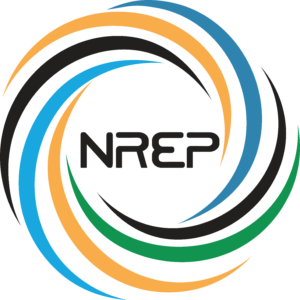Between 8th and 12th September 2025, Entebbe Municipality hosted a comprehensive clean cooking awareness campaign under the Behavioral Change Communication for e-Cooking (BCCeC) Project. This initiative, led by the National Renewable Energy Platform (NREP) and supported by the UK Government through the Modern Energy Cooking Services (MECS) programme, is implemented on behalf of the Ministry of Energy and Mineral Development (MEMD).
The goal was to accelerate the adoption of Electric Pressure Cookers (EPCs) and other modern cooking technologies, promoting healthier, safer, and more sustainable cooking practices across Ugandan communities. Over five days, the campaign featured a clean cooking demonstration, public demonstrations, community sensitization drive, and a stakeholder engagement workshop held at Kitooro Market Hall right at Kitooro Central Market in Entebbe Municipality.
The event brought together local leaders, community members, market vendors and the media all together to join forces for Clean cooking initiatives.
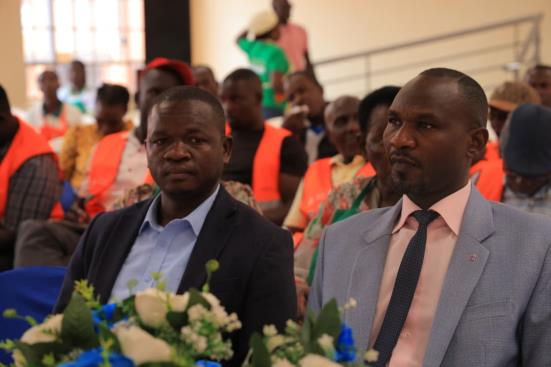
Key Highlights and Observations
- Charcoal remains the dominant cooking fuel for many Entebbe households, especially in informal settlements.
- Participants expressed strong interest in transitioning to electric cooking, particularly after observing live demonstrations.
- There was a notable information gap around the availability and functionality of EPCs prior to the campaign.
- Electricity reliability concerns were raised, especially in areas with frequent power outages.
- Many participants called for subsidy programs or flexible payment models to improve access to EPCs.
- The involvement of local leaders and the media played a key role in mobilizing community participation.
Speakers’ key points and Clean Cooking Demonstrations
Remarks by Local Stakeholders
Mr. Samson James Semakula Agricultural Officer, Entebbe Municipal Council
Mr. Semakula welcomed participants and emphasized that the clean cooking campaign was initiated with the local community in mind. He urged residents to take ownership of the initiative, stressing that modern cooking methods offer a realistic path to improved public health and environmental sustainability.
He further called on participants to reconsider their reliance on charcoal, pointing out that affordable, smoke-free alternatives now exist and are practical for both urban and peri-urban households.
Dr. Paul Nduhuura Head of Research & Capacity Building, NREP
Dr. Nduhuura provided technical insights into the economic value and energy efficiency of electric cooking. He acknowledged that although the initial cost of EPCs might appear high, their long-term savings on fuel and time are significant.
He highlighted the importance of energy stacking, where households can combine multiple cooking energy sources for reliability. Additionally, he emphasized that EPCs come in varied sizes, making them adaptable for domestic use, institutions, and public facilities.
He also reassured participants that efforts are ongoing to make these technologies more financially accessible through partnerships with private sector players.
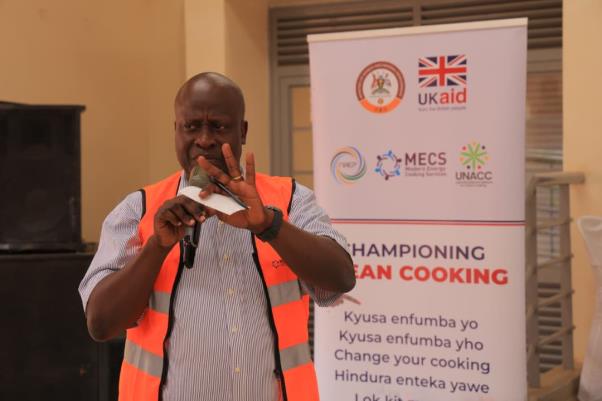
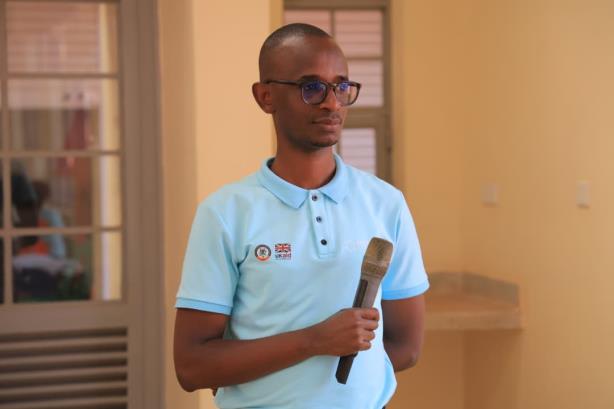
Clean Cooking Demonstrations and Public Engagement
The Entebbe campaign featured an interactive cooking demonstration during the stakeholder engagement that showcased the use of EPCs in preparing local dishes such as matooke, beans, rice, and meat. This live session drew considerable attention, especially from women, youth, men and small food vendors.
Participants were guided through the features and functions of EPCs, including preset timers, energy-saving modes, and safety mechanisms. Many were surprised by the speed and cleanliness of electric cooking, especially when compared to traditional charcoal stoves.
The demonstrations provided a valuable opportunity for hands-on interaction, enabling residents to ask questions, observe best practices, and understand how EPCs can integrate into their daily cooking routines.
The clean cooking event served as a vibrant platform for knowledge sharing, advocacy, and practical demonstrations aimed at accelerating Uganda’s transition to sustainable cooking solutions. The program featured insightful presentations from key stakeholders and hands-on demonstrations of modern cooking technologies, including electric pressure cookers, which drew significant attention from participants.
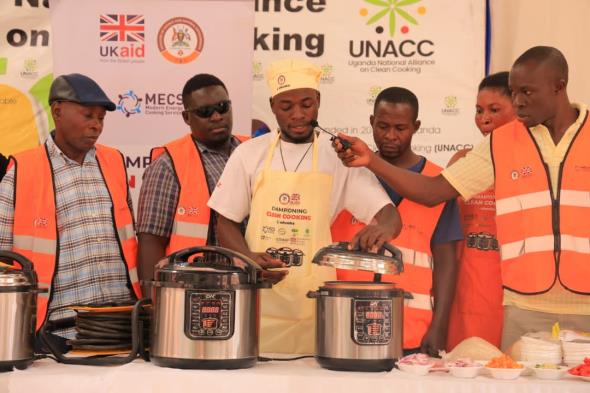
Key Challenges and Lessons Learned
Key Challenges
- High initial costs continue to hinder wide-scale adoption.
- Limited awareness about modern cooking technologies and their long-term benefits.
- Some concerns around electrical safety and usage training, especially among first-time users.
- Access to stable electricity remains a constraint in some parts of Entebbe.
Lessons Learned
- Live cooking sessions are highly effective in building trust and understanding of EPCs.
- Collaborative engagement between local government, media, and technical experts drives greater impact.
- More focus is needed on user education, especially around safe usage and maintenance.
- Future campaigns should include financing and distribution partners to enhance device uptake.
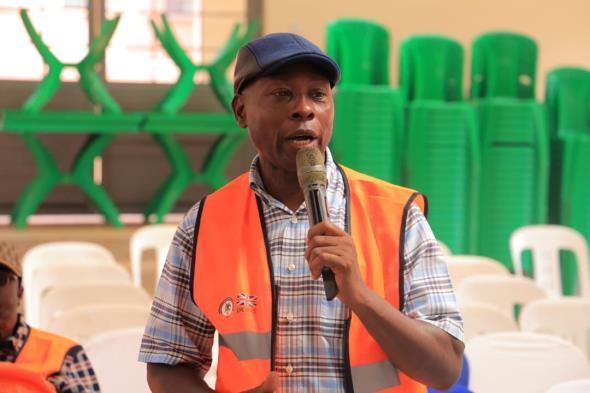
Conclusion and Next Steps
Conclusion:
The clean cooking campaign in Entebbe Municipality was a strategic and timely intervention that aligned with Uganda’s broader vision for sustainable energy access and climate-resilient communities. By connecting residents with practical, smoke-free cooking solutions and relevant technical knowledge, the campaign laid strong groundwork for behavioral change and technology adoption.
The active involvement of local leaders, district officials, technical experts, and the media amplified the campaign’s message and impact. With the increasing demand for clean and affordable energy solutions, Entebbe is well-positioned to become a leading example in Uganda’s transition to electric cooking.
Next Steps:
- Follow-up engagements will be organized by NREP and UNACC to deepen community training, track adoption, and distribute more EPC units.
- Policy support and local ordinances may be explored to encourage adoption at household and institutional levels.
- Continued public sensitization through community radio, churches, and schools will help maintain campaign momentum.
- Pilot programs for affordable financing will be explored to make EPCs more accessible to low- and middle-income households.


